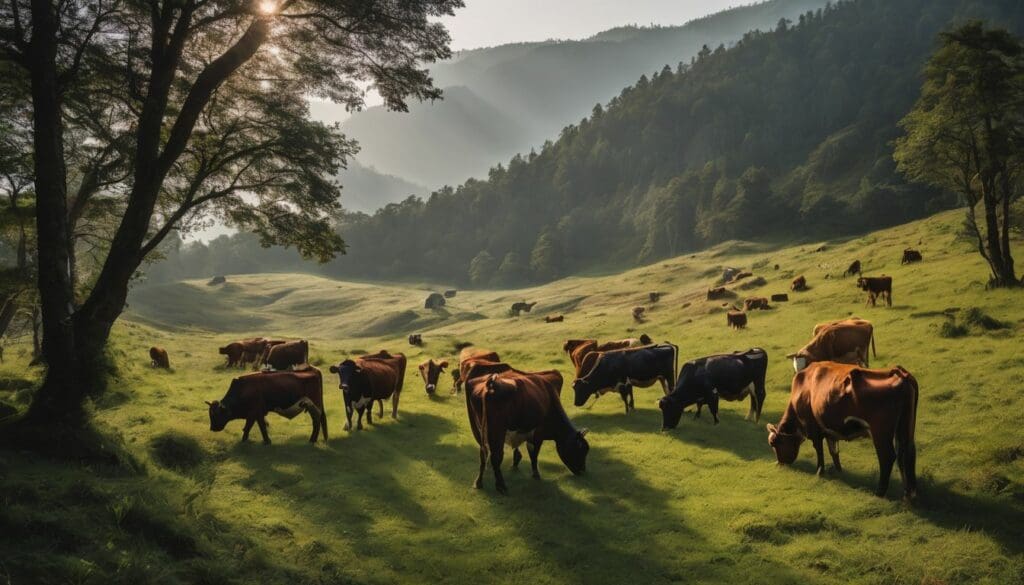Many of us want to protect our planet but might not know where to start. Surprisingly, the steak on your dinner plate has more to do with climate change than you may realise. This blog will guide you through the complex relationship between meat consumption and global warming, offering tangible solutions for a healthier world.
Let’s unearth how changing what we eat can cool down the Earth.
Key Takeaways
- Cows release methane, a gas that’s over 25 times more potent than CO2 at trapping heat in the atmosphere, contributing to climate change.
- Livestock farming demands large amounts of water and land, leading to deforestation and significant carbon emissions which intensify global warming.
- Adopting regenerative grazing improves soil health and increases carbon sequestration which helps combat climate issues caused by beef production.
- Plant – based alternatives can significantly lower greenhouse gas emissions and reduce environmental strain from meat consumption on natural resources like water and land.
- Reducing food waste is crucial; proper meal planning, storage, using leftovers effectively and composting can all decrease the ecological footprint of our diet.
How Does Beef Production Contribute to Greenhouse Gas Emissions?
Beef production contributes to greenhouse gas emissions primarily through methane emissions from cows and land-use change for livestock production. These factors play a significant role in the environmental impact of beef consumption.
Methane emissions from cows
Cows are significant contributors to methane emissions, a potent greenhouse gas. As they digest food, a process called enteric fermentation occurs in their stomachs, releasing methane as a by-product which then makes its way into the atmosphere.
This gas is over 25 times more effective than carbon dioxide at trapping heat, making it a major concern for climate change.
Farmers keep millions of cows worldwide for beef and dairy production. Each individual cow expels large quantities of methane through burps throughout its life. With such vast numbers globally, these emissions add up, posing an environmental challenge that needs addressing to mitigate global warming and support conservation efforts effectively.
Land-use change for livestock production
Livestock production drives land-use change, contributing to deforestation and habitat loss. This expansion results in the conversion of forests and grasslands into pastures and croplands for animal feed, leading to a decrease in biodiversity and wildlife habitats.
The intensification of livestock farming requires more land for grazing, exacerbating the pressure on natural ecosystems.
Rapid deforestation due to expanding livestock production releases significant amounts of carbon dioxide into the atmosphere. The clearing of forests also diminishes their capacity to absorb carbon dioxide, further contributing to greenhouse gas emissions.
The Resource-Intensiveness of Beef Production
Beef production requires a significant amount of resources, particularly water and land. The intensive nature of beef production contributes to its large carbon footprint.
Water usage
Beef production requires significant water usage. Raising livestock for meat consumes vast amounts of water, both directly and indirectly. The water footprint of beef production includes the water needed to grow feed crops and sustain the animals themselves.
This substantial demand contributes to concerns about global freshwater scarcity, making it a key aspect of the environmental impact of meat consumption.
Livestock farming’s heavy reliance on water puts pressure on already limited resources. It is crucial for environmentally conscious individuals to consider the implications of this aspect when evaluating their dietary choices and advocating for sustainable practices in agriculture.
Land usage
Land usage for beef production is significant, with large areas of land needed for grazing and growing feed crops. This leads to deforestation and the conversion of natural ecosystems into farmland, contributing to habitat loss and biodiversity decline.
It also amplifies carbon dioxide equivalent emissions due to reduced forest cover, impacting the planet’s climate.
Moreover, excessive land use for beef production can lead to soil degradation and erosion, exacerbating environmental issues. Sustainable farming practices such as regenerative grazing and reducing food waste play a crucial role in mitigating these negative impacts by improving land health and promoting a healthier environment.
The Debate: Is Beef Production a Significant Contributor to Climate Change?
Beef production is a significant contributor to climate change due to its high levels of greenhouse gas emissions. Methane, a potent greenhouse gas, is released during the digestive process of cows, and the expansion of land for livestock farming contributes to deforestation and habitat loss.
The debate about beef’s impact on climate change centers around the scale of its environmental footprint compared to other food sources. Some argue that reducing beef consumption could significantly lower carbon emissions, while others contend that sustainable practices can mitigate its environmental effects.
Sustainable Solutions for Reducing Emissions from Beef Production
Regenerative grazing practices and the promotion of plant-based alternatives are effective solutions for reducing emissions from beef production. By implementing these sustainable approaches, we can work towards mitigating the environmental impact of meat consumption.
Regenerative grazing
Regenerative grazing promotes healthy soil and grasslands, enhancing carbon sequestration. It involves rotating livestock through different paddocks, allowing vegetation time to recover.
This method builds soil organic matter while reducing the need for chemical fertilizers.
Its positive impact on biodiversity is significant; regenerative grazing restores ecosystems and wildlife habitats. Livestock are managed to mimic the natural movements of wild herds, supporting a more balanced environment.
Plant-based alternatives
Plant-based alternatives offer a sustainable option for reducing the environmental impact of meat consumption. Choosing plant-based foods over animal products can significantly lower greenhouse gas emissions, reduce land and water usage, and support biodiversity.
Shifting towards a diet rich in fruits, vegetables, legumes, and nuts not only benefits the environment but also promotes personal health.
Exploring delicious plant-based recipes and incorporating these into your daily meals empowers individuals to make a positive impact on the planet. By making thoughtful choices about what we eat, we can contribute to a more sustainable future for all.
Reducing food waste
To reduce food waste, individuals can plan meals carefully and buy only what they need. Proper storage of perishable items like fruits and vegetables is crucial to prevent them from spoiling.
Leftovers should be used creatively in new recipes or frozen for later use. When shopping, consumers can choose “ugly” produce that might otherwise go to waste. Additionally, reducing portion sizes and composting organic waste can also help minimise overall food wastage.
Moreover, businesses can implement strategies such as donating surplus food to shelters or food banks instead of throwing it away. Remembering the importance of reducing food waste not only conserves resources but also minimises the environmental impact of agricultural production and land use related to meat consumption.
The Role of Individual Consumption and Government Policies
Educating about the impact of meat consumption, encouraging plant-based diets, and implementing regulations on livestock production are essential for combating climate change. Read more to learn about sustainable solutions for reducing emissions from beef production.
Educating about the impact of meat consumption
Teaching about the effects of meat consumption raises awareness. It empowers individuals to make informed choices. Information can influence dietary decisions, leading to more sustainable food habits.
Educating people highlights the environmental impact of their meat consumption.
Raising awareness promotes a shift towards plant-based diets. Understanding the consequences encourages support for alternative protein sources. This knowledge can inspire advocacy for better policies and practices in animal agriculture.
Encouraging plant-based diets
Promoting plant-based diets can significantly reduce greenhouse gas emissions. Choosing plant-based foods over meat and other animal products can help lower the environmental impact of our diet.
Making this switch is a sustainable choice that supports conservation efforts and minimises land use for farming animals.
Encouraging widespread adoption of plant-based diets inspires a shift towards more sustainable food choices. By opting for wild meats or farmed animals less frequently, individuals contribute to reducing the demand for environmentally impactful meat production.
Implementing regulations on livestock production
Governments can enforce strict regulations on livestock production to reduce environmental impact. These regulations can limit methane emissions from cows and address land-use changes for livestock farming.
By implementing sustainable practices and monitoring compliance, authorities can help mitigate the negative effects of meat production on climate change.
The introduction of stringent regulations ensures that the industry adopts more environmentally friendly methods, reducing resource-intensiveness in beef production. This not only helps to conserve water and land but also promotes a shift towards more sustainable agricultural practices.
Conclusion
In conclusion, the impact of meat consumption on climate change is significant. Individuals can make a difference by choosing plant-based alternatives and reducing food waste. Educating people about the environmental impact of meat production and implementing regulations on livestock can also contribute to mitigating climate change.
It’s crucial for everyone to consider sustainable solutions in order to minimise the detrimental effects of meat consumption on our planet.
FAQs
1. How does meat consumption affect climate change?
Meat consumption affects climate change by increasing greenhouse gas emissions from red meat production and land use for raising livestock.
2. What are the benefits of a plant-based diet for the environment?
A plant-based diet can lead to lower carbon emissions and reduced land use, making it a more sustainable diet option that helps combat climate change.
3. Can switching to plant-based foods really make a difference in climate change?
Yes, choosing plant-based foods over meat can significantly cut down on greenhouse gases related to food production and promote a more sustainable way of living.
4. Are there any statistics showing the impact of meat production on the environment?
Meat production statistics show high levels of resource use and emissions, highlighting the positive environmental effects of reducing meat consumption in favour of a plantbased diet.





